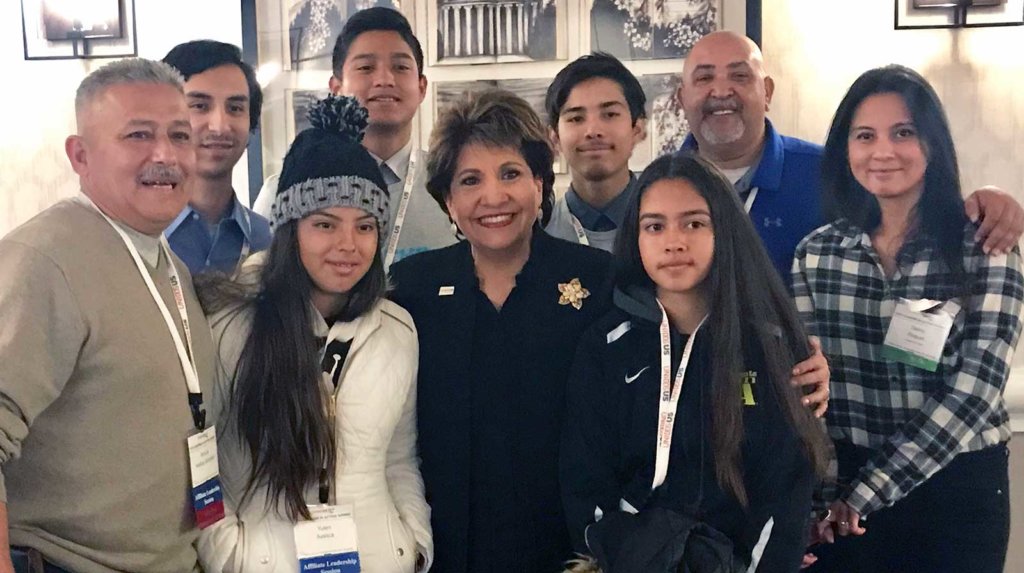New rules protect Latino students affected by college closures
Education Department’s new institutional accountability rules also make it easier for students to get the information they need on funding, access to transcripts, and support for jobs
Last fall, the U.S. Department of Education (ED) published a series of regulatory reforms to strengthen outcomes for students in higher education. The first was a landmark Gainful Employment rule, which holds institutions of higher education— especially for-profit ones— accountable for the financial and professional success of their students. A few weeks later, it was followed with a second package aimed at protecting students and taxpayers from sudden college closures, restricting the practice of withholding transcripts, and giving students more detailed information on financial aid, as well as more robust career services.
“Multiple studies show that a higher ed degree is still considered the best way to achieve greater career opportunities and financial advancement in the United States, but there are many barriers, and we’re hopeful these new rules will help to break them,” said UnidosUS Higher Education Policy Analyst Magin Sanchez. He noted that the GE rule was crucial for paving the way to the latter protections, and it came after 12 years of court proceedings and repeals. “This is great news for Latino students who have often struggled to get through and pay for their degrees.”
Since 2000, Latino enrollment has grown by 164%, but they are also among the populations who struggle hardest to complete and pay for those degrees. The new rules can help to improve this outlook by enhancing the career services capacity of colleges and universities, banning the blanket withholding of transcripts for students defaulting on their loan payments to those institutions, and improving financial transparency by making sure students are fully informed of all costs associated with the pursuit of these degrees.
Protecting Students Against Sudden College Closures
Often left with high debt and poor outcomes, these regulations aim to provide students greater protection from the devastating effects of sudden college closures. Latino students are heavily impacted because of their high enrollment in private, for-profit colleges, where the largest number of such closures occur. Therefore, these protections are vital for Latino college students.
“Too many students have been abandoned by shady colleges that close their doors and leave borrowers with unaffordable debt and little hope of completing their educational journeys and embarking on rewarding careers,” U.S. Secretary of Education Miguel Cardona said in an October 24, 2023 press release.
These new regulations require schools exhibiting warning signs to have teach-out plans or agreements in place and a written plan that provides students with the reasonable opportunity to complete their studies elsewhere in the event of a closure.
A 2023 report by the State Higher Education Executive Officers Association found that students who experienced an orderly closure, one with a teach-out plan and records retention, were positively correlated with enrollment and time to complete degrees.
“These rules will help ensure that students affected by low-performing schools aren’t forced to abandon their aspirations for higher education at no-fault of their own,” said UnidosUS Higher Education Policy Analyst Magin Sanchez.
Combatting the Practice of Transcript Withholding
Another major area of concern is that some institutions, especially for-profit colleges, have a history of withholding transcripts from students with unsettled debt, a practice the educational non-profit educational organization the Young Invincibles calls the “transcript trap.”
“Without access to their official transcript, students are not only unable to reenroll or transfer to another college — their credit is ruined, their total debt load also increases due to collection fees and interest, and they may even be sued,” explains the organization’s website.
Last year, the Young Invincibles collaborated with the Student Borrower Protection Center and the Community Service Society of New York to study a sample of 1,000 students in their state to better understand who is most impacted. The study revealed that in zip codes with the heaviest Latino populations, colleges withheld transcripts at a rate eight times higher than those with the fewest Latinos. The rates were ten times higher in zip codes with the highest Black populations.
“The minimal change to schools’ balance sheets does not justify the long-lasting harm to thousands of students,” the report stated.
About six million students have “stranded credits” due to transcript withholding, according to the research and consulting group Ithaka S+R. UnidosUS has spent years advocating for their right to retrieve these documents.
In 2022, then UnidosUS Higher Education Senior Analyst Amanda Martinez served as the civil rights representative in the negotiated rulemaking process. At that time, she cited a Student Borrower Protection Center report showing that there were twice as many for-profit institutions in zip codes with majority Latino populations. She also noted that during the pandemic, enrollment rates at for-profit institutions had gone up 3%, while other colleges and universities had seen an enrollment decline.
“This should really raise alarm and signal to those who are trying to advance racial equity and close gaps in the higher education system,” Martinez said. But she had also expressed hope that rule strengthening would help to curtail the damages of an unregulated market and restore the promise of the nation’s Higher Education Act.
“It was a civil rights law built on the idea that education is essential to all Americans… But in an unregulated market, that promise is being broken by one specific sector: for-profits,” she said.
“These regulations are a meaningful step towards ending what the [Consumer Financial Protection Bureau] CFPB deemed an abusive practice that has had dire effects on Latino and other students of color. We are glad the department went beyond its original proposed language to provide such broader protections for students”, said .
Improving Information on Financial Aid Packages
These rules also provide Latinos with a more detailed understanding of the financial aid process so that they have a clearer sense of what they will owe and also what opportunities there are to get grant-based funding.
“Many Latinos, like myself, are first-generation college students who don’t have other family members going through the college and financial aid process, so they’re not as well-versed in filling out financial aid forms, learning about scholarships, or considering hidden costs and fees associated with obtaining their degree,” explained Sanchez.
These realities are reflected in data collected by a 2019 UnidosUS statistical brief, which found that in 2016, a majority of Latinos (64%) received a Pell Grant, and 74% applied for financial aid. However, fewer Latinos received institutional aid than their white peers. At four-year public institutions, 26% of Latino students received an award, compared to 31% of white students. At four-year private institutions, 48% of Latino students received an award, compared to 60% of white students.
According to 2022 findings by the U.S. Government Accountability Office (GAO), 91% of colleges either do not include or understate net price, the actual amount a student needs to pay after subtracting grant and scholarship aid in their aid offers; 41% of college do not include a net price, leaving students guessing how much they need to pay; and 50% understate the net price by excluding key costs and/or factoring in loans.
To make matters worse, many financial aid notification letters refer to loans as “awards,” making it seem to some students and parents that the money is a grant or a scholarship. In her role as a civil rights representative, Martinez advocated for referring to any money provided in the form of loans as exactly that, and the new rules reflect these changes in language.
At the same time, the rules prohibit the employment of individuals with a risky history with financial student aid management.
“Students should receive accurate financial aid offers that clearly state the money they must repay. These regulations eliminate a key barrier affecting positive outcomes for first-generation students,” said Sanchez.
Career Services Capacity Building
Finally, the new rules should help Latinos prepare better for the job market while they are still in school. showed that internships were one of the most effective tools for career readiness. In fact, the study noted that Black and Hispanic computer science graduates were much more likely to get well-paying jobs if they had such internships on their résumés.
Still, a 2023 report by the education research foundation Strada found that only 39% of Latinos had gotten an internship by senior year, compared to 54% of white students.
UnidosUS’s education team is not surprised. Studies show that students with at least one parent who went to college are more likely to seek out and take on an internship, but UnidosUS’s data shows that 70% of Latino college students are first-generation.
The new rules address these gaps by requiring that higher education institutions have sufficient career services staff who are well-equipped to identify on-the-job opportunities.
“The success of students is impacted by the capability of institutions to provide a quality education free from abusive and deceptive practices that ultimately impact such students. These strengthened accountability rules for colleges and consumer protection rights will help ensure an equitable higher education system for all” said Sanchez.





